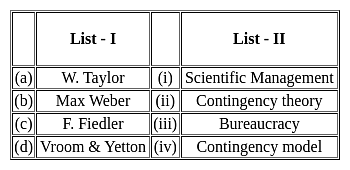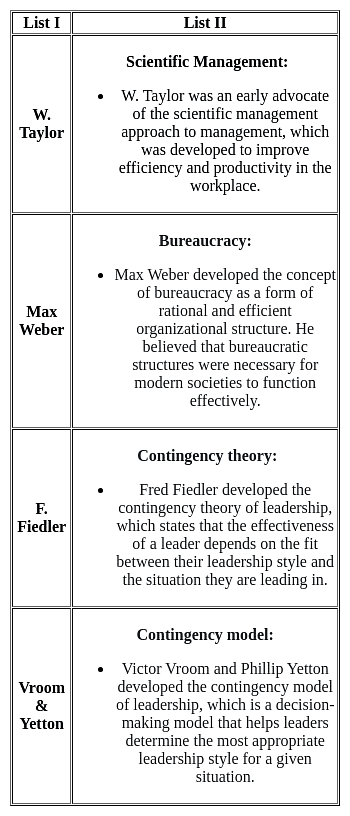UGC NET Paper 2 Education Mock Test - 8 - UGC NET MCQ
30 Questions MCQ Test - UGC NET Paper 2 Education Mock Test - 8
Object Permanence" relates to which of the following stages of cognitive development as propounded by Piaget?
William Kilpatrick popularised the _____________.
| 1 Crore+ students have signed up on EduRev. Have you? Download the App |
Who, among the following sociologists, considered social stratification as desirable and necessary for the system to function smoothly?
A research scholar while nally reporting the research results in the form of a thesis acknowledge the support of his/her supervisor in the preface. This will be treated as a
In Philosophy of education, who is considered as the father of pragmatism:
Leibniz's particles contain information about the universe because they represent it in __________
Match List - I with List - II and choose the correct match using the codes given below :

Given below are two statements
Statement I: Behaviour theory does not concentrate on observable behaviour.
Statement II: Behaviour theory approach involves continuous inquiry.
In light of the above statements, choose the most appropriate answer from the options given below
In which type of education system, students with special educational needs have to be adjusted with the existing school environment?
Deconstruction is a popular method of research in
As a good classroom communicator, you are supposed to know your
Educational psychology as that it describes and explains learning experiences of an individual from either through old age said by
Fritz Heider, an Austrian psychologist has given a great deal of insight into.
Religious education in some forms is essential because it
The number of students in cooperative learning groups is?
Which of the following does not belong to the categories of Coping strategies that women commonly engaged -
As per Existentialism syllabus, important subject emphasized by them are:
Arts, Literature and Music
History & Psychology
Philosophy
Science
A self-assessment
A. supports the concept of assessment for learning.
B. based on the principles of constructivism .
C. can be done by encouraging learners to assess their performance
D. helps learners to get an idea about their strong and weak points and the areas where there is a need for improvement.
Choose the correct option.
According to NEP 2020, as a response to contemporary global challenges 'Global Citizenship Education' will be provided to learners to become active promoters of ________ societies?
A. tolerant
B. peaceful
C. inclusive
D. secure
E. sustainable
Choose the most appropriate answer from the options given below :
In recent times, inter-caste marriages are increasing because of
Which of the following statement is not appropriate to motivation as a process
Superannuation retirement age in Pakistan is
Which of the following statements narrate the logical sequence of steps in standardization of tests? Choose the correct code:
(i) Domain description
(ii) Formulation of test items
(iii) Preliminary try out of test items
(iv) Screening of test items
(v) Deciding the level of objectives
(vi) Critiquing of the difficulty and discrimination power of test items
(vii) Content analysis
(viii) Developing test manual
(ix) Finding out the reliability validity and norms
Which of the following in Tolman’s revision of his system represents motivational principle of Freud?


















